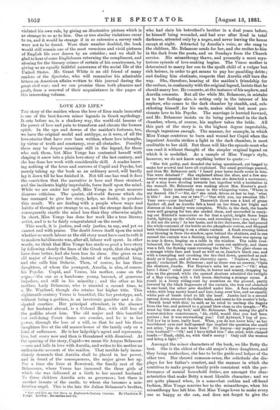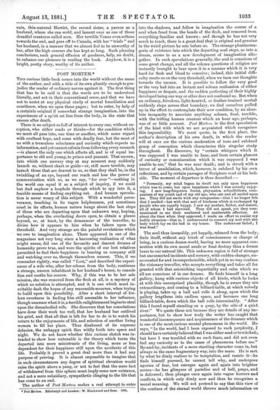LOVE AND LIFE.*
THE story of the maiden whom the love of Eros made immortal is one of the best-known minor legends in Greek mythology. It sets before us, in a shadowy ways the world-old lessons of the power of love and pain to transform and elevate the human spirit. In the ups and downs of the maiden's fortunes, too, we have the original model and antitype, as it were, of all the love-stories that have ever been written, where love triumphs, by virtue of truth and constancy, over all obstacles. Possibly there may be deeper meanings still in the legend, for those who seek them, but Miss Yonge has contented herself with shaping it anew into a plain love-story of the last century, and she has done her work with considerable skill. A reader know- ing nothing of the loves and sorrows of Cupid and Psyche, but merely taking up the book as an ordinary novel, will hardly lay it down till he has finished it. Not till one has read it does the conviction that the narrative is here and there strained, and the incidents highly improbable, force itself upon the mind. While we are under her spell, Miss Yonge in great measure disarms criticism. The quaint, old-world flavour which she has managed to give her story, helps, no doubt, to produce this result. We are dealing with a people whose ways and habits of thought are strange to us, and the strange deeds done consequently startle the mind less than they otherwise might. In short, Miss Yonge has done her work like a true literary artist, and is to be fairly congratulated on the result.
This much, it is justice, and only justice, to say, and yet we cannot end with praise. The doubt forces itself upon the mind whether so much labour as the old story must have cost to refit it to modern habiliments was, after all, labour well spent. In other words, we think that Miss Yonge has made so good a love-story by following closely the lines of the Greek myth, that she might have done better, had she been less its slave. She gives us an old major of decayed family, instead of the mythical king, and she calls him Delavie. Then, of course, he has three daughters, of whom the youngest, Aurelia, is also, of course, his Psyche. Cupid, and Venus, his mother, come on the scene,—the one as a handsome young baronet, of generous impulses, and still in his minority ; and the other as his mother, Lady Belamour, who is married a second time, to a Mr. Wayland, though she retains her higher title. This eighteenth-century Venus is beautiful, like her prototype, and, without being a goddess, is an inveterate gambler and a dis- sipated courtier. Her principal attendant, in the absence of her husband abroad, is a Colonel Mar, with still less of the godlike about him. The old major and this beautiful but evil-doing Court dame are cousins, and he is in her power, through the loss of a will, so that he and his three daughters live at the old manor-house of the family only on a kind of sufferance. He is her ladyship's agent and representa- tive, but every now and then is threatened with dismissal. At the opening of the story, Cupid—we mean Sir Amyas Belamour —sees and falls in love with Aurelia, and writes to his mother an enthusiastic account of the maiden. That terrible lady imme- diately demands that Aurelia shall be placed in her power, and in dread of the consequences, the major gives her up. For a time she lives at Bowstead, the family seat of the Belamours, where Venus has immured the three girls of which she was delivered at a birth to her second husband. To these children Aurelia acts as governess ; but there is another inmate of the castle, to whom she becomes a min- istering angel. This is the late Sir Julian Belamour's brother,
• Lore and Life, an Old Story in Eighteenth-Century Costume. By Charlotte M. Yonge. London : Macmillan and Co.
who had slain his betrothed's brother in a duel years before, he himself being wounded, and had ever after lived in total darkness, attended only by a negro, and never leaving the house except at night. Attracted by Aurelia's voice, as she sang to the children, Mr. Belamour sends for her, and she recites to him in the dark from the poets, and on Sundays from the Church service. His misanthropy thaws, and presently a most mys- terious episode of love-making begins. The Venus mother is determined to marry her son to the spoilt child of a vulgar but rich heiress, in order to get means to pay her gambling debts ; and finding him obstinate, suspects that Aurelia still bars the way. She, therefore, hearing of the maiden's friendship for the recluse, in conformity with the original legend, Insists that he should marry her. He consents, at the instance of his nephew, and Aurelia consents. But all the while Mr. Belamour, in mistake as to her feelings also, is acting only in the interest of his nephew, who comes to the dark chamber by stealth, and, sub- stituting himself, for his uncle, makes silent but most pas- sionate love to his Psyche. The marriage is hurried forward, and Mr. Belamour insists on its being performed in the dark chamber, where, of course, his nephew takes the bride. All this part of the story is in the highest degree improbable, though ingenious enough. The manner, for example, in which Miss Yonge contrives to burn and wound her Cupid when the impatient Aurelia strikes a light in the dark chamber, is most creditable to her skill. But those will like the episode most who can read it without thought of the simpler original legend on which it is modelled. As a sample of Miss Yonge's style, however, we do not know anything better to quote :— " She felt guilty, and dreaded the being questioned, yet longed to make her avowal and have all explained. The usual greetings passed, and then Mr. Belamour said, I heard your horse-hoofs come in late. You were detained ?' She explained about the shoe, and a few sen- tences were passing about her sister, when she detected a movement, as if a step were stealing towards her, together with a hesitation in the remark Mr. Belamour was making about Mrs. Hunter's good- nature. Quite irrelevantly came in the whispering voice, Where is my dearest life ?'—' Sir, sir!' she cried, driven at last to bay, what is this ? Are you one or two P'—‘ One with you, my sweetest life ! Your own—your husband !' Therewith there was a kind of groan further off, and as Aurelia, felt a hand on her dress, her fright and distress at the duality were complete. While, in the dark, the hands were still groping for her, she eluded them, and succeeded in carry- ing out Harriet's manceuvre so far that a quick, bright flame leapt forth, lighting up the whole room, and revealing two—yes, two ! But it did not die away! In her haste, and in the darkness, she had poured the whole contents of the bottle on the phosphoric cotton, and dropped both without knowing it on a chintz curtain. A fresh evening breeze was blowing in from the window, open behind the shutters, and in one second the curtain was a flaming, waving sheet. Some one sprang up to tear it down, leaping on a table in the window. The table over- balanced, the heavy, iron curtain-rod came out suddenly, and there was a fall, the flaming mass covering the fallen ! The glare shone on a strange white face and head as well as on Jumbo's black one, and with a trampling and crushing the fire died down, quenched as sud- denly as it began, and all was obscurity again. Nephew, dear boy, speak,' exclaimed Mr. Belamour; and as there was no answer, Open the shutters, Jumbo. For Heaven's sake let us see !'—' Oh! what have I done !' cried poor Aurelia, in horror and misery, dropping by him on the ground, while the opened shutters admitted the twilight of a May evening, with a full moon, disclosing a strange scene. A youth in a livery riding-coat lay senseless on the ground, partly covered by the black fragments of the curtain, the iron rod clenched in one hand, the other arm doubled under him. A face absolutely white, with long snowy beard and hair, hung over him, and an equally white pair of hands tried to lift the head. Jumbo had in a second sprung down, removed the fallen table and come to his master's help.
Struck head with this,' be said, as he tried to unclasp the fingers from the bar, and pointed to a grazed blow close to the temple.—' We must lay him on my bed,' said Mr. Belamour. Then, seeing the girl's horror-stricken countenance, child, would that you had been patient ; but it was overtasking you! Call Aylward, I beg of you. Tell her he is here, badly hurt. What, yon do not know him,' as her bewildered eyes and half-opened lips implied the question she could not utter, you do not know him ? Sir Amyas—my nephew—your true husband !'—' Oh! and I have killed him !' she cried, with clasped hands.—' Hush, child, no, with God's mercy ! Only call the woman and bring a light.'"
Amongst the minor characters of the book, we like Betty the best. She is the eldest of the old major's three daughters, and they being motherless, she has to be the guide and helper of the other two. Her shrewd common-sense, the solicitude she dis- plays for her father's comfort, and the manner in which she contrives to make proper family pride consistent with the per- formance of menial household duties, are amongst the char- acteristics that make Betty a most likeable character ; and we are quite pleased when, in a somewhat sudden and off-hand fashion, Miss Yonge marries her to the misanthrope, when his misanthropy has left him. But Miss Yonge loves to make every one as happy as she can, and does not forget to give the vain, thin-natured Harriet, the second sister, a parson as a husband, whom she can scold, and lament over as one of those dreadful creatures called men. Her terrible Venus even softens towards the end, and goes off to Canada, with her " trials " and her husband, in a manner that we almost feel to be unworthy of her, after the high courses she has kept so long. Such pleasing conclusions, such general effusion of goodness, help, no doubt, to enhance our pleasure in reading the book. Anyhow, it is a bright, pretty story, worthy of its author.































 Previous page
Previous page